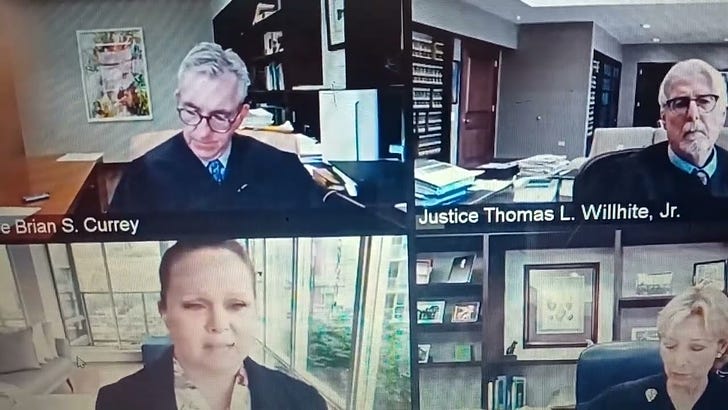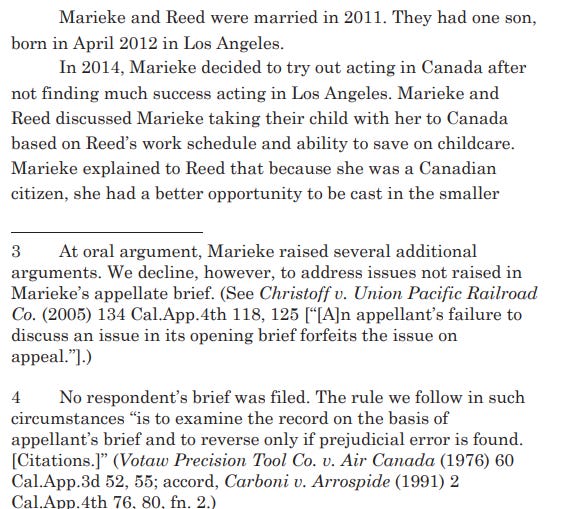Loss for Marieke Randoy in California Appeal
The court argues that if anyone was kidnapping her son it was her.

Marieke “Marika” Randoy suffered a loss at the California Appeals level.
I spoke with her in June after the oral arguments but before a judgment had been rendered.
Things looked promising since her ex did not file a response, and the oral arguments did not include anyone to argue the other side.
Furthermore, the judges asked no questions and never challenged her argument.
Judge Brian Currey admonished her for both speaking about things in the appeal and for speaking about things not in the appeal.
The oral argument is below.
In the oral arguments, Marika argued that her son was effectively kidnapped by an illegal order from Judge Tamara Hall in 2015. She argued that she was living in Canada when Judge Hall issued an illegal and ex-parte order which ordered her to show up in California and change custody of her son. Here’s what I previously wrote when I originally covered this story.
In the summer 2015, she was living in Vancouver, Canada with her son and then husband in an apartment they’d leased. Then, her husband devised a scheme.
He walked into the chambers of Los Angeles County Superior Court Judge Tamara Hall; he boldly demanded an ex-parte order granting him temporary sole custody.
Hall granted it to him with no hearing and immediately ordered Marika, living in Canada totally unaware of the circumstances, to appear shortly in her courtroom for a formal hearing.
Judge Hall then started issuing a series of temporary orders which other judges for five years rubber stamped, which kept Marika away from her son.
Judge Hall also pops up in Bill Sardi’s case.
The appeals court saw it quite differently. The court’s argument is below.
From there, court got into a complex legal analysis in which it argued that jurisdiction had been established based on these set of facts and as such, Judge Hall had every right to order Marika back to California. The opinion is listed as “unpublished”, meaning it can’t be cited in any other cases.
There are three main problems with their argument. First, even though the court claims that Canada was only a temporary residence, it still acknowledges that Canada was the residence for the family for the previous year and the family had a lease for an apartment in Canada. That’s below.
Second, when I quizzed Marika’s ex-husband's attorney about this, he could not provide me with a physical address where his client was living at the time when he went into Judge Hall’s chambers.
When I asked him what physical address his client was using at the time he filed in Judge Hall’s court, he responded, “As I sit here, I don’t recall.”
I have not found a physical address which he was using at the time; Marika has told me that he used a P.O. Box.
Finally, none of this was introduced during her oral arguments, and if this was the direction the court was heading, it seems only sporting that they would have confronted her with these facts and allowed her to challenge them at oral arguments.
Instead, Judge Currey admonished her multiple times for both talking about things in her appeal and things not in her appeal and no judge asked any questions.
In other words, the California courts would have one believe that Marika was required to stay in California, where she had no permanent address, and she was taking her son illegally to Canada to live in the same place he had been living for a year.
Marika addressed this briefly in a new motion she filed.
On June 5, 2015, Los Angeles Superior Court Judge Tamara Elaine Hall acted outside her territorial jurisdiction, in complete absence of all authority to seize a child from a foreign country and cause this child to be transported across an international border and two state lines, by force, threat of force and fraud on the court. In that same moment Judge Tamara Elaine Hall issued ex parte orders, without notice or opportunity to be heard, to strip Marieke of all her rights of custody and access to her then 3-year-old son, indefinitely.
The question whether the search or seizure was reasonable is one of law, not fact. The reviewing court does not defer at all to the lower court under the “de novo” standard, which applies most commonly to issues of pure law. (People v. Gordon (1990) 50 Cal.3d 1223, 1242-1243 Examples include the interpretation of a statute, the reasonableness of a search and seizure, or the constitutionality of a certain procedure. A trial court's exercise of discretion will not be disturbed unless it appears that the resulting injury is sufficiently grave to manifest a miscarriage of justice. (Jessup Farms v. Baldwin (1983) 33 Cal.3d 639, 650-651, fn. 7.) In other words, discretion is abused only if the court exceeds the bounds of reason, all of the circumstances being considered."
The requirement that a court have subject-matter jurisdiction means that the court can only assume power over a claim which it is authorized to hear under the laws of the jurisdiction.
However, the main thrust of her appeal had to do with a technical question about a set of facts introduced by the appeals court regarding what happened to her son after he was forced to live in Canada.
Second, we reject Marieke’s contention that the court improperly applied the “changed circumstances” standard. After a ““judicial custody determination, the noncustodial parent seeking to alter the order for legal and physical custody can do so only on a showing that there has been a substantial change of circumstances so affecting the minor child that modification is essential to the child’s welfare.’ [Citation.]” (F.T. v. L.J. (2011) 194 Cal.App.4th 1, 15.) Here, Marieke sought custody of the child (i.e., a modification of the October 31, 2016 domestic violence restraining order awarding Reed sole legal and physical custody of the child). Marieke fails to cite, and we have not located, any case law supporting her contention that the “changed circumstance standard” is improperly applied when the custody order in place at the time was a domestic violence restraining order as opposed to a “parenting plan.”
Third, Marieke argues the trial court made what “amounts to a child custody award to non-party {ex-husband’s new girlfriend} ” It did not. The plain language of the judgment states: “[Reed] shall continue to have sole legal and sole physical custody of the minor child per Judge Tamara Hall’s October 31, 2016 order of protection.” That Reed and the child live in {the new girlfriend’s} house is not tantamount to an award of physical custody to {the new girlfriend}.
Marika argues that this argument did not come before the court or was argued during the oral argument. As such, a re-hearing- according to California law- is required.
The Decision relied on the argument: “That Reed and the child live in {the new girlfriend’s} house is not tantamount to an award of physical custody to {the new girlfriend}”. This argument was not proposed or briefed by any party to the proceeding.
Government Code section 68081 provides that before an appellate court “renders a decision in a proceeding other than a summary denial of a petition for an extraordinary writ, based upon an issue which was not proposed or briefed by any party to the proceeding, the court shall afford the parties an opportunity to present their views on the matter through supplemental briefing. If the court fails to afford that opportunity, a rehearing shall be ordered upon timely petition of any party.”, Because that did not happen here, a rehearing is mandatory.
This argument brings up another point of contention. Marika argues that her son was living with her ex-husband’s new girlfriend at her residence. Meanwhile, her ex-husband was living on a boat.
Who exactly has been raising her son since 2015? The court has created quite a mess.
Finally, I received a note through Facebook messenger from someone who believes I have been unfairly maligning Marika’s ex-husband. Here is part of what they said.
He continued living and working in California while she and the child were in Canada. He visited the child every few weeks or so. She and the child returned to California April 2015. He filed for divorce May 2015. The standard family law restraining order prohibited her and dad from leaving California with the child. End of May 2015 she disobeyed the order, and took the child to Canada. She never tells that part. She always begins her tale with the June 5, 2015 ex-parte orders. She never acknowledges the part she played in the loss of custody of her child, and this is very dangerous for someone who is a vocal and public as she is, someone to whom other vulnerable parents look to for advice.
This isn’t about you or about me, I have nothing against you at all. What I do care about very much so is protecting vulnerable parents from misinformation. Sometimes, it IS the parent’s fault and it’s NOT the corrupt court system. This is one of those cases. So, it’s very wrong to present it as anything otherwise. The child wasn’t kidnapped.
I don’t know why no one in her life has been honest with her or given her any advice over the past several years that would actually help her. Instead of doing backflips with all these pointless court antics and appeals and thinking she’s going to successfully file any kind of lawsuit or get anywhere with the Supreme Court, instead of trying to hurt the dad and get him thrown in jail for some nonsense, instead of making all these videos and obsessively pouring over case law that doesn’t apply and trying to overturn an appeal she already lost - why has no one ever told her in the last 5-7 years that she instead should move back to California, set up a decent home for herself and her child, get a job, comply with the psych eval that was ordered, and THEN return to family court to ask for shared custody?
Post-Script
Check out the previous articles in this series: Part 1, Part 2, Part 3, Part 4, Part 5, Part 6, Part 7, Part 8. Part 9, Part 10, Part 11, Part 12, Part 13, Part 14, Part 15, Part 16, Part 17, Part 18, Part 19, Part 20, Part 21, Part 22, Part 23, and Part 24.
To support more stories like this please consider contributing to the Orange County fundraiser.







